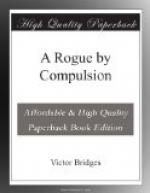“You think they’re spies?” I said quietly.
He nodded his head. “That’s it, sir. Spies—that’s what they are; a couple o’ dirty Dutch spies—damn ’em.”
“Why don’t you tell the police or the naval people?” I asked.
He laughed grimly. “They’d pay a lot of heed to the likes o’ me, wouldn’t they? You can lay them two fellers have got it all squared up fine and proper. Come to look into it, an’ you’d find they was artists right enough; no, there wouldn’t be no doubt about that. As like as not I’d get two years ‘ard for perjurin’ and blackmail.”
To a certain extent I was in a position to sympathize with this point of view.
“Well, we must keep an eye on them ourselves,” I said, “that’s all. We can’t have German spies running up and down the Thames as if they owned the blessed place.” I got up and knocked out my pipe. “The first thing to do,” I added, “is to summons them for sinking your boat. If they are spies, they’ll pay up without a murmur, especially if they really tried to do it on purpose.”
Mr. Gow nodded his head again, with a kind of vicious obstinacy. “They done it a-purpose all right,” he repeated. “They seen me watching of ’em, and they knows that dead men tell no tales.”
There scarcely seemed to me to be enough evidence for the certainty with which he cherished this opinion; but the mere possibility of its being a fact was sufficiently disturbing. Goodness knows, I didn’t want to mix myself up in any further troubles, and yet, if these men were really German spies, and, in addition to that, sufficiently desperate to attempt a cold-blooded murder in order to cover up their traces, I had apparently let myself in for it with a vengeance.
Of course, if I liked, I could abandon Mr. Gow to pursue his claim without any assistance; but that was a solution which somehow or other failed to appeal to me. In a sense he had become my retainer; and we Lyndons are not given to deserting our retainers under any circumstances. At least, I shouldn’t exactly have liked to face my father in another world with this particular weakness against my record.
Altogether it was in a far from serene state of mind that I climbed down into the dinghy, and allowed Mr. Gow to row me back to the bank.
“Will you be over tomorrow, sir?” he asked, as he stood up in the boat ready to push off.
“I don’t think so, I shall be rather busy the next two or three days.” Then I paused a moment. “Keep your eyes open generally, Mr. Gow,” I added; “and if any more gentlemen who have lost their way to Tilbury come and ask you the name of the Betty’s owner, tell them she belongs to the Bishop of London.”
He touched his cap quite gravely. “Yessir,” he said. “Good-night, sir.”
“Good-night, Mr. Gow,” I replied, and scrambling up the bank, I set off on my return journey.




